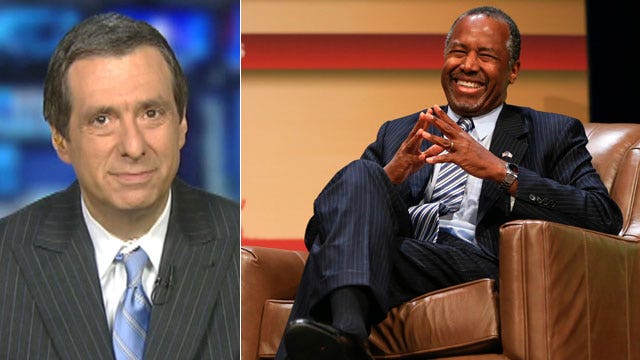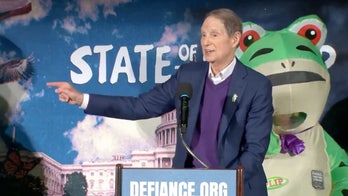Kurtz: Can Dr. Carson be the GOP’s cure?
'Media Buzz' host on whether retired neurosurgeon can stand out in Fox News 2016 GOP debate
Ben Carson has some strong feelings about the media. In fact, it was the first thing he wanted to talk about.
“It distorts things enormously when the press picks sides,” he says. “That allows the side they pick to ignore the Constitution, to ignore the laws.” But, he allows, “I haven’t given up on the press yet.”
Carson knows he has been eclipsed by Donald Trump as much as any other presidential candidate, since he is running as a non-politician, a doctor who can diagnose and repair a broken system. Temperamentally, he is Trump’s polar opposite: soft-spoken, patient, reluctant to throw punches.
And the overriding question heading into this week’s Fox debate: Does this man have what it takes to be truly competitive in a crowded and intensely competitive field? Does he have the proverbial fire in the belly?
I asked Carson in an interview last week if he had made mistakes with the media, and he readily acknowledged that he had learned some lessons.
“I’ve learned how to phrase things in a way that people can actually hear what I’m saying,” Carson told me. “If you use certain words, it can be the most wonderful thing, they won’t hear it.”
The smarter approach, he says, is “dialing back what I say. The things I’ve said, I truly believe. But I recognize it has been hurtful.”
Carson talked himself into trouble last fall when he said that “ObamaCare is really, I think, the worst thing that has happened in this nation since slavery,” and “it is slavery in a way.”
Again last March, Carson told CNN that being gay “absolutely” is a choice, because “a lot of people who go into prison straight and when they come out they’re gay.” He later apologized, saying he didn’t know what causes sexual orientation.
Carson says Republicans can’t simply repeal ObamaCare without replacing it with something else. But he is determined to deflect questions about which early state he might win to put him on a path to the GOP nomination, and he uses a telling analogy. “As a surgeon people are always asking, ‘What’s going to happen?’ And I’ll say, ‘Why guess when soon you’ll know?’ We’ll find out.”
The GOP’s only black presidential candidate also admitted to a major political shortcoming: “It’s really against my personality to be licking people’s boots and say please give me money.” He raised $8.3 million in the last quarter, with an average donation of 50 bucks.
And he is decidedly low-key on the Trump phenomenon: “Donald Trump, obviously he takes away all of our support, and it’s okay because he creates enthusiasm.” (Trump, by the way, called into “Face the Nation,” “This Week” and “Meet the Press” yesterday; Carson appeared on the NBC show as well.)
He told me that Trump could help him by beating up on other candidates in this week’s Fox debate, “so I don’t have to do it.”
Carson, who came to national prominence after speaking out against President Obama at a National Prayer Breakfast, says his candidacy was a response to a calling from above. Rather than retire to his new Florida home on a golf course, Carson said he told the Lord: “If you open the doors, I’ll walk through.”
Carson’s religious approach was on display when he said his rationale for a flat tax was rooted in the Bible. When I asked if he thought there should be no progressive aspect to the tax code that puts a higher burden on the wealthy than the poor, he shot back: “If you tell me why progressive is better than what God says, I’m all ears.”
The fact that this novice is pretty much assured of making the Fox debate, when governors and former senators may miss the cut, is a significant achievement.
But Carson’s numbers have been slipping during the Trump surge, and in the latest Quinnipiac poll, he’s in a four-way tie for fourth place. In a Wall Street Journal/NBC poll out yesterday, Trump led with 19 percent, Scott Walker 15, Jeb Bush 14, and Carson at 10 percent.
Carson let slip that he had recently been at a dinner with Valerie Jarrett and Eric Holder, and Holder thanked him for saying that despite their disagreements, the former attorney general should be treated with respect.
“I don’t savage anybody,” he says. “From their perspective, they’re doing what people want, even though people don’t know what they want. It doesn’t necessarily make them horrible, evil people.”
Whether a novice politician who doesn’t savage the other side can win a presidential nomination is, as Carson might put it, in God’s hands.













































